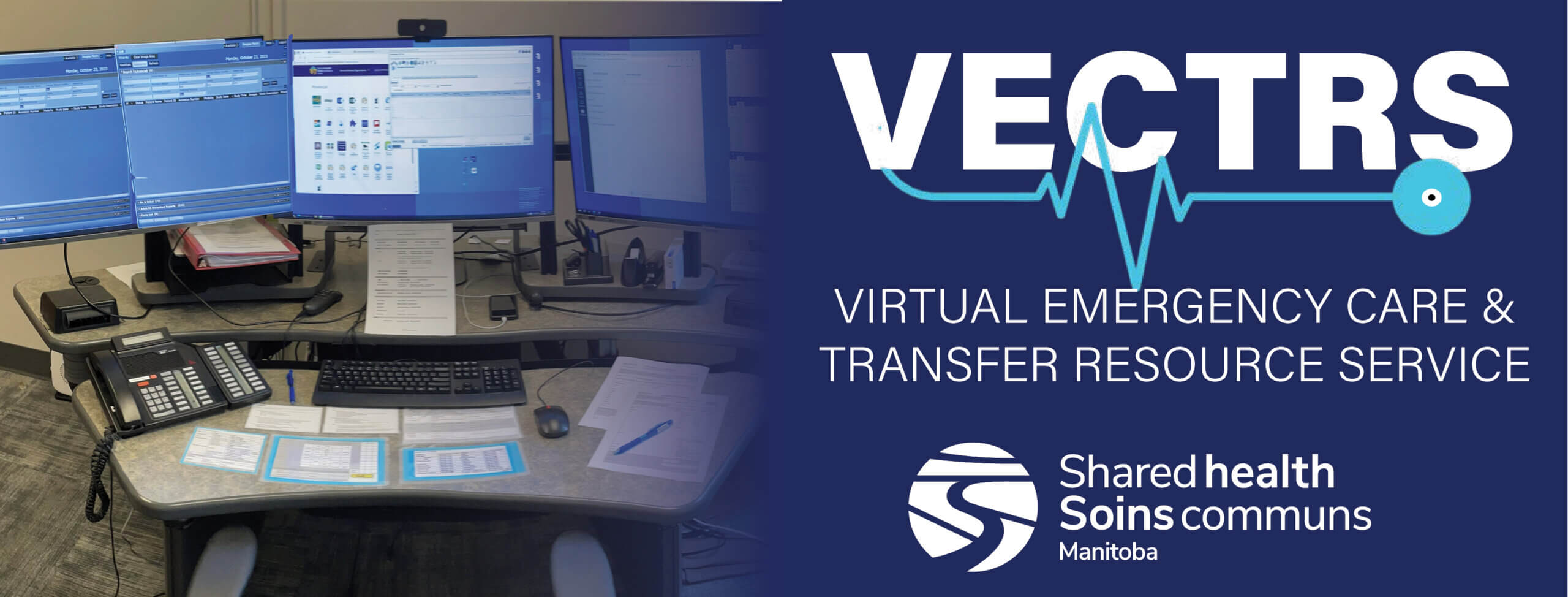
THIS PAGE IS UNDER DEVELOPMENT
The Virtual Emergency Care and Transfer Resource Service (VECTRS) is Manitoba’s centralized and coordinated source for clinical guidance and patient transport support. As a single point of contact VECTRS supports continuity of care in urgent, emergent and critical situations when time is of the essence.
The service formally launched in May 2023 and has incrementally been scaling up operations since that time. VECTRS provides virtual support and consultation with an emergency specialist who can help with the care plan of critically ill patients. This expert advice helps to better determine appropriate transfer locations (or provide virtual clinical support to a rural or remote site and avoid a transport).
The virtual service is staffed by emergency physicians, Advanced Care Paramedics (ACP) and Advanced Practice Respiratory Therapists (APRT) to provide 24/7 emergency care and transport advice with the support of Inter-Facility Transport Coordinators (IFTCs) who initially answer the phone.
Once fully operational VECTRS clinical staff will offer health-care providers immediate medical advice and specialist consultation for patients meeting the following criteria:
- Life, limb or vision threatening conditions
- Emergent or urgent conditions
- Require transfer to an Emergency Department, Intensive Care Unit or Urgent Care Centre
Contacting VECTRS
VECTRS staff is available 24/7 to offer health-care providers immediate medical advice and specialist consultation for patients meeting the following criteria:
- Life, limb or vision threatening conditions
- Emergent or urgent conditions
- Require transfer to an Emergency Department, Intensive Care Unit or Urgent Care Centre
VECTRS Implementation Status
Upcoming Implementation Milestones
Add new dates here as they become available.
i.e. northern clinicians calling VECTRS – date tbd.
Past Implementation Milestones
Since launching in May 2023, VECTRS has seen several milestones as work towards full operational status continues.
Among the highlights have been:
- Introduction of a standardized Inter-Facility Transport (IFT) triage scale, for all IFTs that pass through VECTRS
- Trauma Team Activation for all major trauma destined for HSC
- The Child Health Transport Team (CHTT) triage has been incorporated into the VECTRS call flow for pediatric patients.
- VECTRS Status Board
- VECTRS launched its own ED Status Board via EDIS which is specific to VECTRS and will be used to monitor patient care and track patient transfers as required.
- Patient Intake Form
- The Patient Intake Form is a snapshot in time at the first point of contact for VECTRS and populates specific fields on the VECTRS Status Board.
- Responsibility for Basic Air Ambulance Triage
- VECTRS assumed responsibility for the triage of all air ambulance cases in Manitoba, effective Sept. 5, 2023. Prior to this date basic air ambulance calls were handled by the Medical Transportation Coordination Centre (MTCC). Basic air ambulance calls will continue to be dispatched by MTCC while VECTRS will be responsible for triage only.
- Once at VECTRS, the case is registered in the provincial Emergency Department Information System (EDIS) and then a detailed medical triage is conducted by a clinician – either APRT, Emergency Physician or both.
- Based on this triage, a transport acuity score will be assigned and the patient placed in a priority list based on the acuity of their medical concerns. The priority list guides the assignment of air ambulance resources at MTCC, ensuring patients with more acute needs receive transport sooner.
- The process for critical care and child health cases remains unchanged with VECTRS including the STARS/LifeFlight Transport Physician and Child Health Transport Team respectively to perform the triage.
- Inferred Stroke Activations
- As a result of VECTRS stroke protocol implementation there has already been a time reduction with stroke patients receiving interventions at HSC. (get percentages)
VECTRS Forms & Files
Any forms, files, algorithms can all be located here.
VECTRS Statistics
Updated May 6, 2024
